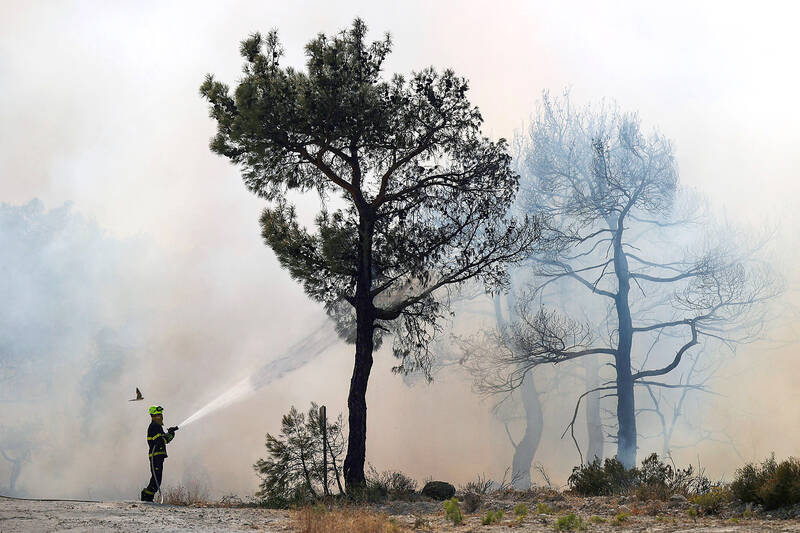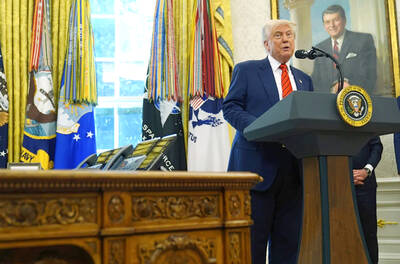In a controversial bid to expose supposed bias in a top journal, a US climate expert shocked fellow scientists by revealing that he tailored a wildfire study to emphasize global warming.
While supporters applauded Patrick Brown for flagging what he called a one-sided climate “narrative” in academic publishing, his move surprised at least one of his coauthors — and angered the editors of leading journal Nature.
“I left out the full truth to get my climate change paper published,” read the headline to an article signed by Brown published on Tuesday on the news site The Free Press.

Photo: Reuters
He said that he deliberately focused on the effect from higher temperatures on wildfire risk in a study in the journal, excluding other factors such as land management.
“I just got published in Nature because I stuck to a narrative I knew the editors would like,” the article read. “That’s not the way science should work.”
One of the named coauthors of the study, Steven Davis, an Earth system science professor at the University of California, Irvine, said that Brown’s comments took him “by surprise.”
“Patrick may have made decisions that he thought would help the paper be published, but we don’t know whether a different paper would have been rejected,” he said in an e-mail. “I don’t think he has much evidence to support his strong claims that editors and reviewers are biased.”
Brown is codirector of the climate and energy team at the Breakthrough Institute, a private nonprofit group that researches technological responses to environmental issues, including boosting nuclear energy.
He did not respond to a request to comment, but wrote about his revelation in detail on his blog and on X, formerly known as Twitter.
A number of posts applauded Brown for his “bravery,” “openness” and “transparency.” Others said his move raised ethical questions.
His presentation of the research in the study “is a choice, but to boast about it publicly is next level,” David Ho, a climate scientist at the University of Hawaii at Manoa, wrote on X.
Ivan Oransky — cofounder of Retraction Watch, a blog that tracks cases of academic papers being withdrawn — said that Brown’s move “ends up feeling like a sting operation ... of questionable ethics.”
“Do scientists clean up the narrative to have a stronger story? Absolutely. Do scientists need to publish in order to keep their jobs? Absolutely,” Oransky said.
“It’s just that he got there by a remarkably flawed logic experiment that of course is convincing all of the people who are already convinced that scientists are not rigorous and honest about climate change in particular,” he said.
Nature’s editor-in-chief Magdalena Skipper called Brown’s actions “irresponsible,” adding that they reflected “poor research practices.”
She said that the key issue of other climate variables in the study was discussed during peer-review.
She pointed to three recent studies in the journal that explored factors other than climate change regarding marine heat waves, Amazon emissions and wildfires.
“When it comes to science, Nature does not have a preferred narrative,” she said in a statement.
Brown disagreed in a post on X.
“As someone who has been reading the Nature journal family, submitting to it, reviewing for it, and publishing in it, I think that is nonsense,” he wrote.
Scientists often complain of the pressure on young researchers to “publish or perish,” with research grants and tenure hanging on decisions by editors of science journals.
“Savvy researchers tailor their studies to maximize the likelihood that their work is accepted,” Brown wrote. “I know this because I am one of them.”
In publishing, “it is easy to understand how journal reviewers and editors may worry about how a complex subject, particularly one that is politically fraught, will be received by the public,” said Brian Nosek, a psychologist and cofounder of the Center for Open Science, a US body that promotes transparency in scholarship.
“But science is at its best when it leans into that complexity and does not let oversimplified, ideological narratives drive how the evidence is gathered and reported,” he added.
“It is unfortunate, but not surprising, that Patrick felt like he had to be a willing participant in oversimplifying his work to have a career in science,” he said. “In that long run, that is not a service to him, the field or humanity.”

A new online voting system aimed at boosting turnout among the Philippines’ millions of overseas workers ahead of Monday’s mid-term elections has been marked by confusion and fears of disenfranchisement. Thousands of overseas Filipino workers have already cast their ballots in the race dominated by a bitter feud between President Ferdinand Marcos Jr and his impeached vice president, Sara Duterte. While official turnout figures are not yet publicly available, data from the Philippine Commission on Elections (COMELEC) showed that at least 134,000 of the 1.22 million registered overseas voters have signed up for the new online system, which opened on April 13. However,

ALLIES: Calling Putin his ‘old friend,’ Xi said Beijing stood alongside Russia ‘in the face of the international counter-current of unilateralism and hegemonic bullying’ Chinese President Xi Jinping (習近平) yesterday was in Moscow for a state visit ahead of the Kremlin’s grand Victory Day celebrations, as Ukraine accused Russia’s army of launching air strikes just hours into a supposed truce. More than 20 foreign leaders were in Russia to attend a vast military parade today marking 80 years since the defeat of Nazi Germany in World War II, taking place three years into Russia’s offensive in Ukraine. Putin ordered troops into Ukraine in February 2022 and has marshaled the memory of Soviet victory against Nazi Germany to justify his campaign and rally society behind the offensive,

CONFLICTING REPORTS: Beijing said it was ‘not familiar with the matter’ when asked if Chinese jets were used in the conflict, after Pakistan’s foreign minister said they were The Pakistan Army yesterday said it shot down 25 Indian drones, a day after the worst violence between the nuclear-armed rivals in two decades. Pakistani Prime Minister Shehbaz Sharif vowed to retaliate after India launched deadly missile strikes on Wednesday morning, escalating days of gunfire along their border. At least 45 deaths were reported from both sides following Wednesday’s violence, including children. Pakistan’s military said in a statement yesterday that it had “so far shot down 25 Israeli-made Harop drones” at multiple location across the country. “Last night, India showed another act of aggression by sending drones to multiple locations,” Pakistan military spokesman Ahmed

US President Donald Trump on Wednesday said that he would make a decision about how the US government would refer to the body of water commonly known as the Persian Gulf when he visits Arab states next week. Trump told reporters at the White House that he expects his hosts in Saudi Arabia, Qatar and the United Arab Emirates will ask him about the US officially calling the waterway the Arabian Gulf or Gulf of Arabia. “They’re going to ask me about that when I get there, and I’ll have to make a decision,” Trump said. “I don’t want to hurt anybody’s